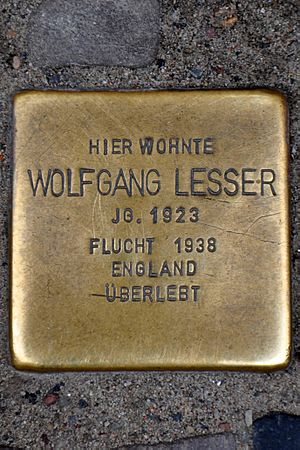Wolfgang Lesser facts for kids
Wolfgang Lesser (born May 31, 1923 – died September 27, 1999) was a German composer and an important music official in the German Democratic Republic (GDR), also known as East Germany. He wrote many songs, stage music, and film scores.
Contents
A Musician's Journey
Wolfgang Lesser was born in Breslau (which is now Wrocław, Poland). His father was a merchant. Wolfgang went to school in Berlin and then learned to be a metalworker. In 1938, he started studying music at the Stern Conservatory in Berlin.
Escaping to England
Because he was Jewish, Wolfgang had to leave Germany in 1939 to escape the Nazis. He moved to London, England. There, he worked as a painter and a farmhand. In 1940, during World War II, he was held in a camp on the Isle of Man because he was from a country that was at war with England. People from enemy countries were sometimes held in these camps.
Joining the Fight
In 1942, Wolfgang joined the Freie Deutsche Jugend (Free German Youth), a group that fought against the Nazis. He also became a member of the Communist Party of Germany. From 1943 to 1947, he served in the British Army.
Returning to Germany
After the war, in 1947, Wolfgang Lesser returned to Berlin. He joined the SED, which was the leading political party in East Germany. He worked for the Free German Youth in different roles. In 1949, he attended a special school for the SED party.
From 1950 to 1954, he continued his music studies at the Hochschule für Musik "Hanns Eisler" with famous teachers like Hanns Eisler. After finishing his studies, he worked as a composer and teacher for the State Folk Art Ensemble of the GDR from 1954 to 1961. After that, he became a full-time musician, working for himself.
Important Roles in Music
Wolfgang Lesser became a very important person in the music world of East Germany. From 1964 to 1978, he was a leader in the Association of German Composers and Musicologists (VDK/VKM). This group was for people who wrote music and studied music.
He also became a member of the cultural committee for the main political group in East Germany, the Politbüro des ZK der SED. He was also a member of the Volkskammer, which was like the parliament (law-making body) of East Germany, until 1989. There, he worked on education. From 1983 to 1985, he was in charge of an organization that protected the rights of performers. He was also the Secretary-General of the Music Council of the GDR. From 1985 to 1989, he was the President of the Association of Composers and Musicologists.
Lesser's Compositions
Wolfgang Lesser was known for writing many political songs and chansons (a type of song). He also composed music for plays, like for Friedrich Wolf's Thomas Müntzer. He wrote music for films too, including the DEFA films Die Schönste (1957), Beschreibung eines Sommers (1962), and König Drosselbart (1965). He even wrote a school opera called Oktoberkinder in 1970.
Wolfgang Lesser passed away in Berlin when he was 76 years old.
Musical Works
Here are some of Wolfgang Lesser's musical works:
- Liederzyklus (Song Cycle) (1957)
- Violinkonzert (Violin Concerto) (1962)
- Sonate für Solovioline (Sonata for Solo Violin) (1963)
- Das Jahr. Zyklus für Kinderchor und Instrumente (The Year. Cycle for Children's Choir and Instruments) (1963)
- Wir – die Partei (We – the Party) (1971)
Stage Music
Music he wrote for plays:
- For Friedrich Wolf's Thomas Müntzer
- For Ben Jonson's Volpone
- For George Farquhar's Glückritter
Film Music
Music he wrote for movies:
- 1957: Die Schönste
- 1959: Claudia
- 1960: Der neue Fimmel
- 1961: Drei Kapitel Glück
- 1961: Steinzeitballade
- 1962: Entdeckung des Julian Böll
- 1962: Peter und das Einmaleins mit der Sieben
- 1962: Freispruch mangels Beweises
- 1962: Das Stacheltier – Die Moritat vom Durst
- 1963: Beschreibung eines Sommers
- 1964: Deutschland – Endstation Ost
- 1964: Als Martin vierzehn war
- 1965: König Drosselbart
- 1966: Lebende Ware
Awards and Honours
Wolfgang Lesser received many important awards for his work:
- Vaterländischer Verdienstorden (Patriotic Order of Merit) in Bronze (1964), Silver (1973), and Gold (1978)
- Ehrenspange zum Vaterländischen Verdienstorden in Gold (Honor Clasp to the Patriotic Order of Merit in Gold) (1983)
- Kunstpreis der DDR (Art Prize of the GDR) (1968)
- Nationalpreis der DDR (National Prize of the GDR) (1969)
- Stern der Völkerfreundschaft (Star of People's Friendship) in Gold (1988)
Remembering Wolfgang Lesser
In Stralsund, a special memorial called a Stolperstein (stumbling stone) is placed in front of house number 21/22 on Ossenreyerstraße. This small, shiny stone remembers Wolfgang Lesser and his life.

 | Toni Morrison |
 | Barack Obama |
 | Martin Luther King Jr. |
 | Ralph Bunche |

